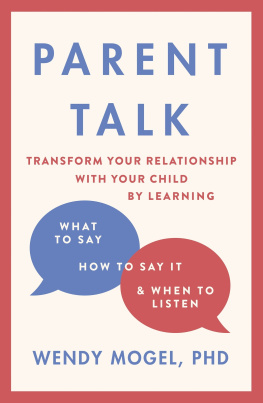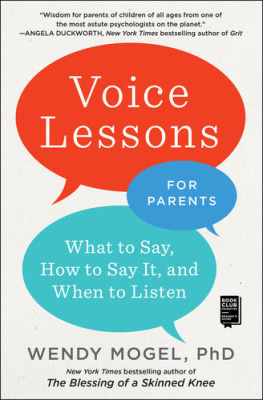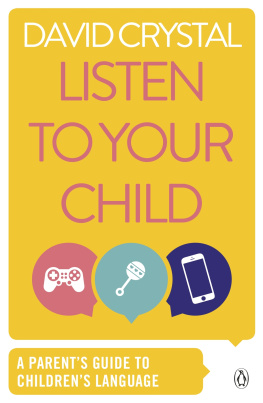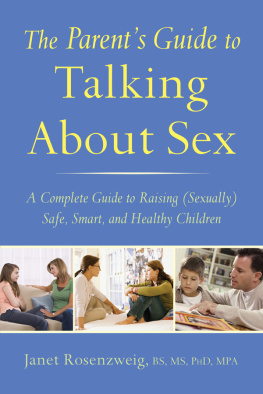PENGUIN LIFE
PARENT TALK
Dr Wendy Mogel is a clinical psychologist, parenting expert, a New York Times bestselling author and international keynote speaker. Her mission is the protection and promotion of self-reliance, resilience, accountability and exuberance in children. She was once on a programme with President Barack Obama, once with His Holiness the Dalai Lama, and once with the circus.
CHAPTER 3: THE BIGGEST, STRONGEST, FASTEST
, The Trustees, youll find more information about handling situations where a teacher is clearly unfit for the job.
CHAPTER 4: THE BOSS, THE BESTIE, THE HIGH PRIESTESS OF PRETEND
Parents of young children are dismayed when I tell them that the age of the onset of puberty continues to drop. What the American Academy of Pediatrics once classified as an abnormality called precocious puberty (defined by onset at age eight in girls and nine in boys) is now considered within the normal range.
CHAPTER 5: HARD TOPICS
See Recommended Readings for her titles and other books I regularly suggest to parents about subjects that typically cause nervousness or inhibition.
Take a look at books listed in the Recommended Reading section for answering childrens questions about other ways babies come to be.
CHAPTER 10: THE TRUSTEES
In private schools and public schools in high-tax-bracket districts, you can distinguish the teacher parking lot from the one reserved for the high school students in an instant. The lot with the newer, more expensive models? Students.
ALSO BY WENDY MOGEL
The Blessing of a Skinned Knee
The Blessing of a B Minus
Wendy Mogel
PARENT TALK
Transform Your Relationship with Your Child by Learning What to Say, How to Say It and When to Listen
PENGUIN LIFE
UK | USA | Canada | Ireland | Australia
India | New Zealand | South Africa
Penguin Life is part of the Penguin Random House group of companies whose addresses can be found at global.penguinrandomhouse.com.
First published in the United States of America by Scribner, an imprint of Simon and Schuster, Inc. 2018
First published in Great Britain by Penguin Life 2018
Copyright Wendy Mogel, 2018
The moral right of the author has been asserted
ISBN: 978-0-241-27659-4
To Ann and Leonard Mogel
It was as though she had stepped into a boat and was swept off by a strong current. She did not know what all the words meant, and she could not pronounce a good many of the names, but nobody interrupted to correct her, and she read on and on, steadied by the strongly marked rhythm, drawn forward swiftly from one clanging, sonorous rhyme to another.
Dorothy Canfield Fisher, from Understood Betsy, 1916
Authors Note
When I was a psychology student in the 1970s, some awful fictions were sold as fact: schizophrenia was caused by schizophrenogenic (overprotective yet rejecting) mothers; autism by refrigerator mothers; male homosexuality by weak dads, helpless to control their overbearing wives. During the same era, the womens movement aimed to banish the concept of biology as destiny. Girls and boys came into the world as equals. What mattered was nurture. Provide girls with blocks and boys with dolls, and the differences would evaporate. While well-intentioned, this approach to protecting rights and allowing for growth and unlimited opportunity was too narrow and didnt withstand scientific scrutiny.
Yet the 1970s also yielded some awesome truths that hold today. One was the theory of psychological androgyny developed by social psychologist Sandra Bem. Her robust research revealed that girls who exhibited some traits traditionally considered masculine and boys who displayed some that were considered feminine were emotionally healthier than children whose range of attitudes and behaviors fell at the extremes of gender norms. Bem found that narrowly defined, restrictive gender roles had a negative effect on individuals and on society as a whole.
Bem began a movement that shifted from fixed definitions of gender expression to todays more nuanced understanding of the rich and complex variations of human identity and sexuality. In the late 1980s, I had an experience that helped me deepen my insight into this topic. The parents of four-and-a-half-year-old Ash came to see me about their sons perplexing behavior. His mom said, At least once a day, Ash suddenly turns his head and looks upward with a concerned expression on his face. Then he lifts his arms, bends both elbows, scrunches up his fists, and dashes across the room on his toes. I asked him why he was doing this and he explained in a matter-of-fact tone, When Cinderella sees the clock is about to chime midnight, she has to gather up the skirts of her ball gown so she can fly over to the pumpkin coach really, really fast. Dr. Mogel, were worried hes suffering from gender identity disorder.
At that time, GID was considered a mental disorder and was much in the news. To determine an appropriate diagnosis and treatment plan, I consulted with two senior psychiatrist colleagues who specialized in working with young boys who had this condition. One held a philosophy of rigid rules akin to those employed by gay conversion therapists: Tell those parents to immediately purge the boys room of any dolls and feminine costumes, not to permit any playdates with girls, and that Dad has to start playing sports with him every day. They should also enroll him in at least one peewee team.
The other colleague said, Tell the parents to let him be. To celebrate his imagination and even join in the fun. Mom might ask, Do the seats in a pumpkin coach have cushions? Or are they more like benches?
When I met with Ashs parents I told them not to worry over his present behavior or forecast his future. All we know now is that sometimes hes Cinderella and we love him. And that your respect for his creativity and self-expression is vital for his growth.
The 1990s brought advanced technological tools in neuroscience, providing a flood of data about gender differences in rates of cognitive, emotional, and physical development; sensory perceptions like hearing and sight; anatomy and brain architecture; the effect of hormones on emotions; and other attributes that are subtle but . Today most mental health professionals (and young people) understand that gender falls on a spectrum rather than into neat binary categories, and that each persons experience of who they are, how they want to dress, what name they prefer to be called, and who they are drawn to for companionship, romance, and sexual involvement dont fit into predetermined or fixed classifications.
With technology and social media, parents must be lifelong learners in order to make and enforce sensible and protective rules for their children. The same is true of understanding gender expression. If you want your child to see you as a trusted traveler, you have to do your homework. I know of no better starting place than the website genderspectrum.org. Its a jargon-free, non-polemical, sober, and thorough resource for educators, parents, and teenagers.
In reading the Parent Talk chapters about boys and girls and my statements about attitudes and behaviors of mothers and fathers, please insert mental quotation marks as needed around the references to gender differences. The same applies if you are a single parent, a same-sex couple, or belong to any of the new family configurations that now coexist alongside the more traditional nuclear family.










